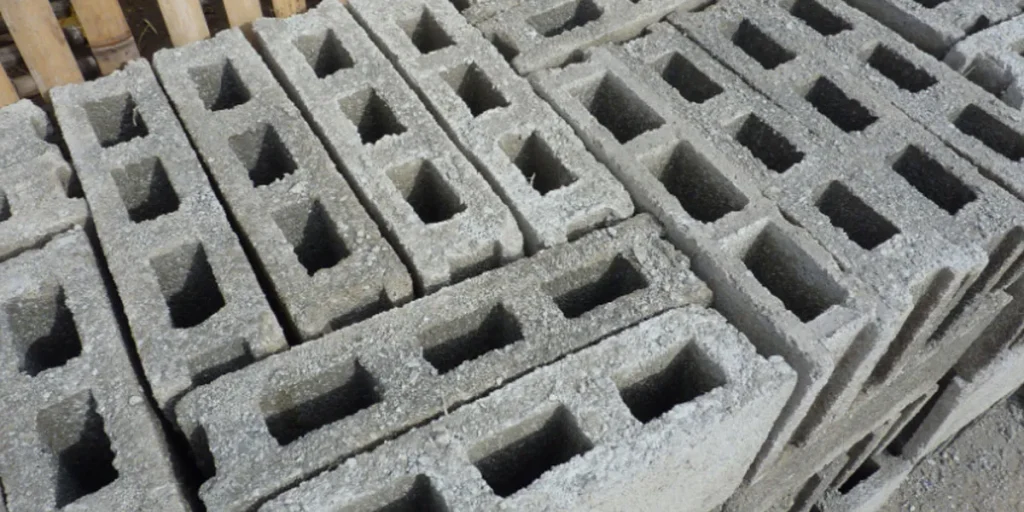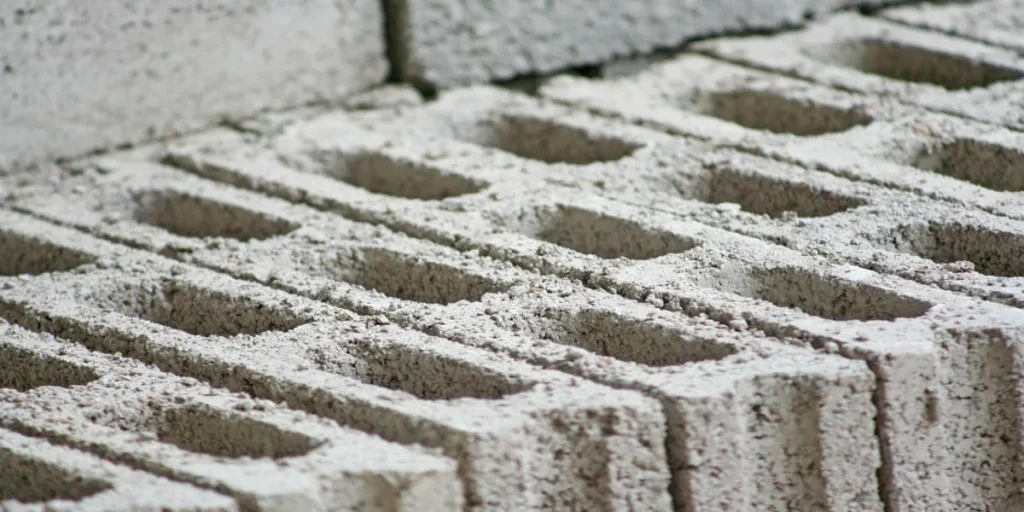Standard concrete blocks typically weigh between 28 to 35 pounds (12.7 – 15.9 kg). The weight varies based on the block’s size and density.
Concrete blocks, often referred to as concrete masonry units (CMUs), are a staple in construction due to their strength and versatility.
They come in a variety of sizes and weights, designed to meet different structural requirements and building codes.
Contractors and DIY enthusiasts frequently use these blocks for projects ranging from foundation work to retaining walls.
Their popularity stems from their durability and the significant thermal mass they provide, contributing to energy efficiency in buildings.
When selecting concrete blocks for a project, it’s important to consider not only the weight but also the specific properties that align with the construction needs.

Concrete Blocks: A Weighty Matter
Concrete blocks play a pivotal role in modern construction. Their durability and strength support a variety of structures.
Yet, their weight can be surprising to many. This post delves into the heft of these essential building materials!
Variety And Common Uses
Concrete blocks come in numerous sizes and forms. Each has a unique weight and specific application.
| Type of Block | Common Use | Average Weight |
|---|---|---|
| Solid concrete block | Structural walls | 38-45 lbs |
| Hollow concrete block | Non-load-bearing walls | 22-28 lbs |
The Composition Equation
The weight of a concrete block is closely tied to its composition. A mixture of cement, sand, aggregates, and water defines this. Let’s break it down:
- Cement: The glue binding other materials.
- Sand: Fine particles that fill gaps and add bulk.
- Aggregates: Gravel or crushed stone increasing strength.
- Water: Activates cement and binds the mixture.
A block’s density and weight increase with more cement and aggregates.
Standard Block Sizes And Their Mass

Concrete blocks come in various sizes and weights. Professionals select them based on project requirements.
Understanding the standard sizes and corresponding weights aids in accurate planning and execution of construction projects.
Comparing Different Dimensions
Concrete blocks are modular, making them a popular building material. The most common dimensions are:
- 8-inch by 8-inch by 16-inch
- 6-inch by 8-inch by 16-inch
- 4-inch by 8-inch by 16-inch
These blocks differ in weight. Larger blocks support more weight but also weigh more. The 8-inch block is the heaviest, usually around 40 pounds.
The 6-inch block weighs approximately 30 pounds. The 4-inch block is the lightest, with a weight close to 17 pounds.
Let’s see these weights in a simple table:
| Block Size (inches) | Approximate Weight (pounds) |
|---|---|
| 8 x 8 x 16 | 40 |
| 6 x 8 x 16 | 30 |
| 4 x 8 x 16 | 17 |
Density And Its Role In Weight
The weight of a concrete block depends on its density. Density varies based on the composition of the concrete mix.
A denser block contains more aggregate and less air. Consequently, it weighs more. Lightweight blocks, often used for non-load-bearing walls, contain more air.
They are easier to handle and weigh less.
A standard concrete mix has a density of about 145 pounds per cubic foot. Higher density blocks are used for load-bearing walls.
They provide greater strength and rigidity. Lower density blocks are chosen for their thermal insulation and ease of installation.
Understanding both size and density is crucial for choosing the right block for your project. It ensures structural integrity and efficient use of resources.
Analyzing The Weight Of A Single Block

Concrete blocks are essential in construction. Their weight influences stability and transport costs. A single concrete block’s weight varies, depending on size and composition.
From Hollow To Solid: A Spectrum
Concrete blocks range from hollow to solid. Let’s explore:
- Hollow blocks are lightweight, used for partitions.
- Semi-solid blocks provide more strength and weigh more.
- Solid blocks boast the highest weight and used in load-bearing walls.
A typical 8″x8″x16″ hollow block weighs around 30 pounds. A solid counterpart might double that weight.
Industrial Standards And Tolerances
Block weights follow industry guidelines. Factors affecting weight include:
| Material | Standard Weight | Tolerance |
|---|---|---|
| Lightweight | 28-35 pounds | ±3 pounds |
| Medium weight | 35-40 pounds | ±3 pounds |
| Heavyweight | Over 40 pounds | ±3 pounds |
Denser materials, such as sand and gravel, increment weight. Precise manufacturing ensures these weights stay within tolerances.
Calculating Total Weight For Construction Projects
Knowing the total weight of concrete blocks is vital in construction. It helps with planning and efficient resource allocation.
This understanding ensures safety and structural integrity of the project. It also impacts logistics, such as transportation.
Project Scale And Quantity Estimates
Every construction project starts with estimation. The scale of your project determines the number of concrete blocks needed.
Assess the project size first. Use blueprints to calculate the wall area. Next, find the standard size of the block you’ll use.
| Type of Block | Standard Size (LxWxH) | Weight (approx) | Blocks per Square Foot |
|---|---|---|---|
| Solid Concrete Block | 8″x8″x16″ | 36 lbs | 1.125 |
| Cinder Block | 8″x8″x16″ | 28 lbs | 1.125 |
Multiply the needed blocks by their weight. This calculation gives you the total weight to expect. For precision, consider mortar and reinforcement materials.
Impact Of Weight On Transportation
The weight of concrete blocks affects transport. Heavy loads require stronger, often more expensive, transport solutions.
- Check vehicle capacity before loading blocks.
- Calculate total weight and compare with limits.
- Heavy deliveries can need special permits.
- Costs rise with weight due to fuel and potential tolls.
Plan wisely to reduce trips and save money. Safety is a top priority. Overloading can lead to vehicle damage and road hazards.
Assessing Concrete Blocks
Heft Versus Strength: Assessing Concrete Blocks dives into the intriguing balance construction professionals must strike.
Concrete blocks form the backbone of many structures due to their robust nature. Yet, their weight classes vary significantly, impacting their use.
Let’s deconstruct this balance between durability and mass to help you pick the perfect block for any project!
Balancing Act Of Durability And Mass
The weight of concrete blocks is not just about raw mass. It connects closely to the block’s strength and durability.
A standard 8-inch concrete block typically weighs around 36 pounds. But weights can change with different sizes and compositions.
Lighter blocks are easier to handle but may not support heavy structures. Heavier blocks pack more strength but are tougher to install.
Choosing The Right Block For The Job
Selecting a concrete block is a crucial decision in construction. For garden walls, a lightweight block might suffice.
Yet, for load-bearing walls, you need a heavyweight champion. Consider the following choices:
- Lightweight Blocks: Ideal for non-load-bearing applications
- Mid-weight Blocks: Versatility for mixed-use projects
- Heavyweight Blocks: Necessary for support and foundation
Remember to check the block’s density rating labeled as light, medium, or heavyweight. This rating indicates its mass and directly implies its strength. Use a density table for quick guidance:
| Density Rating | Weight per Block | Typical Use |
|---|---|---|
| Light | < 25 lbs | Decorative |
| Medium | 25 – 35 lbs | Residential Walls |
| Heavy | > 35 lbs | Foundations |
Remember, heavier does not always mean better. Assess the specific needs of your project before making a choice.
Take into account the environment, structure weight, and installation processes. Choose wisely to ensure a perfect blend of heft and strength.
FAQs About the Weight of Concrete Blocks
What Is The Standard Weight Of Concrete Blocks?
Concrete blocks typically weigh between 28 to 36 pounds (12. 7 to 16. 3 kg). This can vary based on the size and density of the block material.
Standard hollow concrete blocks are lighter, while denser, solid blocks weigh more.
How Does The Size Affect Concrete Block Weight?
The weight of a concrete block increases with its size. For instance, a standard 8″x8″x16″ hollow block weighs around 36 pounds, while a smaller 4″x8″x16″ may weigh about 18 pounds. Larger blocks naturally contain more material, thus are heavier.
Are All Concrete Blocks The Same Density?
No, concrete blocks vary in density. Lightweight blocks, often used for non-load-bearing walls, are less dense, while structural blocks are denser and heavier. The type of aggregate used can also affect the block’s density and weight.
Can Weather Affect The Weight Of Concrete Blocks?
Weather conditions have minimal impact on concrete block weight. Concrete absorbs a small amount of moisture when exposed to rain, but this does not significantly alter its weight. Properly cured blocks maintain consistent weight regardless of weather.
Conclusion
Understanding the weight of concrete blocks is crucial for any construction or DIY project. These blocks vary in size and thus in weight.
Always plan logistics and safety accordingly. Remember that industry standards can guide you. For your specific needs, consult with a professional.
Build safely and smartly.
